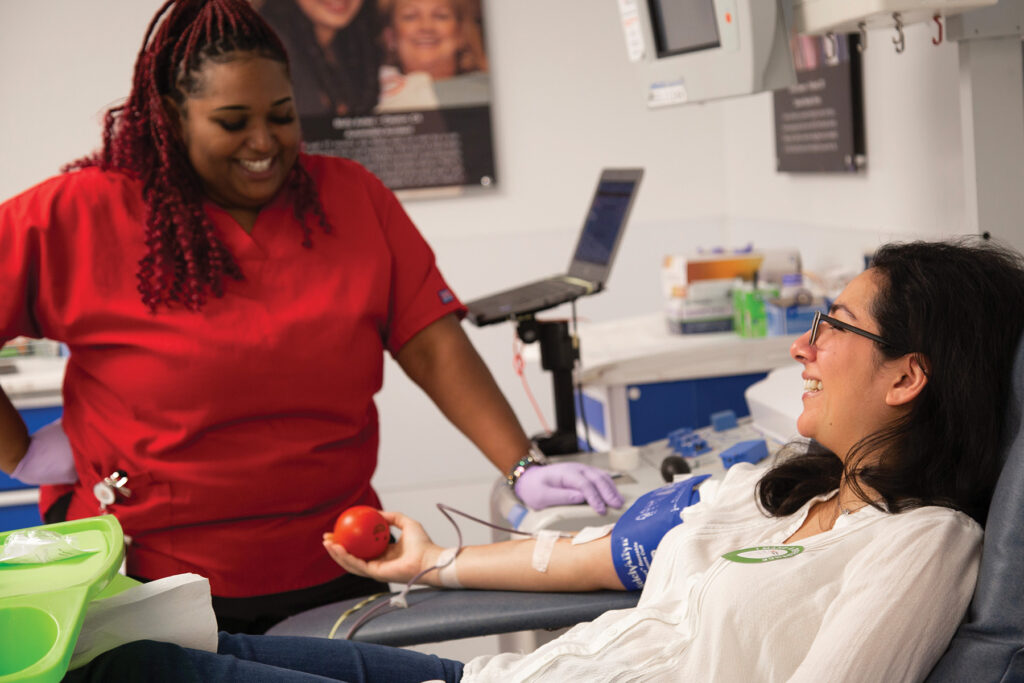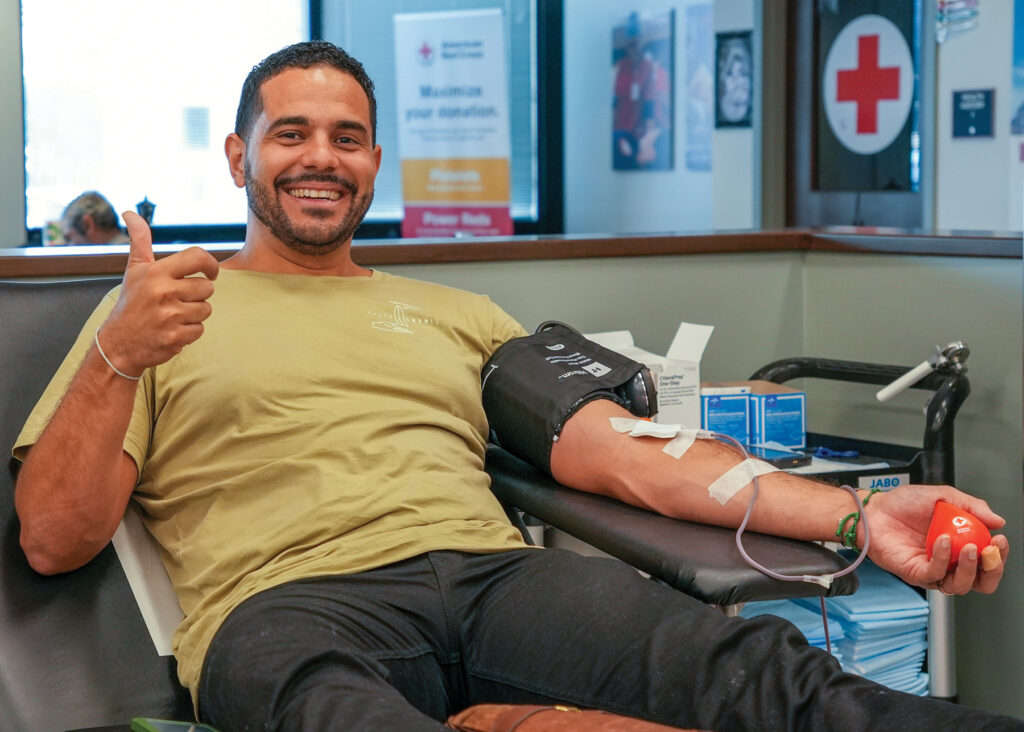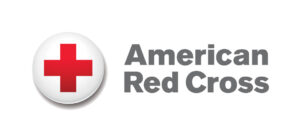Help Save Lives During National Blood Donor Month

Article by American Red Cross
Did you know that giving one hour of your time to donate blood can literally save someone’s life? If you’ve been thinking about a New Year’s resolution to help others, the simple act of donating blood can make you someone’s hero.
Since 1970, National Blood Donor Month has been observed each January to recognize the importance of giving blood and platelets and to honor those who roll up a sleeve to help patients in need.

May 24, 2023. Washington, DC. American Red Cross staff member Danielle Lewis collects a whole blood donation from Evelyn Kaviani at the Dr. Charles R. Drew Red Cross Blood and Platelet Donation Center in Washington, D.C. on May 24, 2023.
Photo by Amanda Romney/American Red Cross
Need for blood donations
Each month, the American Red Cross must collect thousands of blood donations to meet the needs of individuals who need blood including accident victims, burn victims, heart surgery and organ transplant patients, and those receiving treatment for leukemia, cancer or sickle cell disease. The need for blood never ends. In fact, someone in the U.S. needs blood every two seconds.
The winter months can be especially difficult to collect enough blood and platelets to meet patient needs. Inclement weather can result in blood drive cancellations, and seasonal illnesses such as the flu can prevent some donors from making or keeping appointments to give. During the holiday season, festive activities and busy calendars also disrupt normal routines resulting in a bigger drop in donations.
Although 62 percent of the U.S. population is eligible to donate, only 3 percent actually donate. The American Red Cross works to raise awareness of the never-ending need for blood in hopes more individuals will become regular donors.
Eligible individuals are encouraged to make donating blood a priority especially those with type O blood and those giving platelets, however, every donation type is needed. To learn more about eligibility, go to redcrossblood.org or download the Red Cross Blood Donor App. Once online or in the app, donors can put in their zip code to find a location nearby and a date and time that’s convenient.

October 23, 2023. Burbank, California. Although he wasn’t sure of his blood type at the time of donation, Alexis Agrinsoni knew that Latino blood donors have a high chance of being a match for patients that need Type O blood. Photo by Mimi Teller/American Red Cross
Preparing to donate
Taking a few simple steps before donating can help including eating iron-rich foods, drinking water, and getting rest. Donors must bring a photo ID and know their medications to answer specific health questions prior to donating. Completion of a RapidPass® online health history questionnaire is encouraged to help speed up the donation process by going to RedCrossBlood.org/RapidPass or using the Blood Donor App.
Upon arriving to donate, donors should be prepared to show ID, and answer a few more questions, or complete the health questionnaire onsite if not already completed. The donation time for a whole blood donation is about 8 to 10 minutes. Whole blood is the most flexible type of donation and can help multiple people when separated into specific components of red cells, plasma and platelets. Eligible donors may donate whole blood as often as every 56 days.
Once the donation is collected, staff will direct the donor to a table with drinks and snacks to replenish for a few minutes. An incentive such as a t-shirt or other Red Cross item is often available as a thank you.
Addressing donation myths and special needs
Many myths exist about donating blood, therefore, the frequently asked eligibility questions online at redcrossblood.org provide details reflecting current guidelines. In recent years, restrictions have been lifted for those who travel outside the U.S. and to make blood donation more inclusive. In 2023, the FDA announced new blood donation eligibility guidelines eliminating longstanding broad, time-based deferrals based on sexual orientation.
Any changes in eligibility requirements are approved by the Food and Drug administration to ensure the blood supply remains safe for everyone while also ensuring more people are eligible to donate.
For some individuals, blood transfusions are not just a one time need, but are essential to quality of life. Patients with sickle cell disease can require multiple blood donations each year, and the donated blood must match the recipient’s blood type to avoid transfusion-related complications. Since most patients with sickle cell disease are Black or African American, the most compatible blood type is often from a donor of the same race or ethnicity.
To learn more about Sickle Cell Disease and donation needs for these patients, visit RedCrossBlood.org.
Upcoming blood drive
Numerous blood drives are held across the Kansas City metro each week. Consider donating at any location such as the 8th annual Katie Scott blood drive. This drive is named in honor of Katie, who died in 2018 of a rare bone cancer, Ewing Sarcoma. Multiple blood transfusions helped prolong her life. The drive will be held February 7, 2025 from 8:30 a.m. to 5 p.m. at the Sheraton Overland Park Hotel, 6100 College Blvd, Overland Park, KS 66211
To make an appointment or to learn more, download the American Red Cross Blood Donor App, visit RedCrossBlood.org, call 1-800-RED CROSS (1-800-733-2767) or enable the Blood Donor Skill on any Alexa Echo device.







